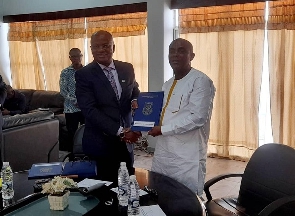 Executives captured in a photo
Executives captured in a photo
The Abuja Memorandum of Understanding (MOU) on Port State Control for the West and Central African Region, has partnered with the Regional Maritime University (RMU) to provide International Maritime Organization (IMO) specialized training courses for Port State Control officers at the university.
Symbolically, a MOU was signed between the two partners in Accra on Tuesday with the first batch of training set to begin in June as part of efforts to ensure that ships or vessels that would be operating within the region met the right standards to ensure safety.
The collaboration essentially, would provide training on IMO Model course 3.09 and related IMO/ILO conventions, guidelines, circular publications, and other related courses to Port State Control officers in the Abuja MOU region.
A Port State Control officer is usually trained to carry out inspections on foreign ships in national ports to verify that their conditions and equipment comply with acceptable standards.
Whereas, the Abuja MOU is one of the nine Regional MOUs established under IMO Resolution A.682 (17) of 1991. Operating under a Cooperative Agreement with IMO, Abuja MOU was established as an intergovernmental organization comprising the
Maritime Administrations of 20 countries abutting the Atlantic Coast of Africa.
Speaking at the MOU signing with the RMU, the Secretary-General, Abuja MOU Region Capt. Sunday M. Umoren said they were excited to begin the training with the RMU which was a highly respected institution within the sub-region and beyond.
The RMU he said, had over the years produced graduates and staff contributing to the growth of the maritime sector and hosting the Port State Control officer’s training was a step in the right direction.
“The training is focused on capacity development which is lacking within the region, which is affecting the quality of ships on African waters,” he stated.
Without proper control, he said, Africa would become a dumping ground for substandard ships which would have dire consequences on efforts to develop the maritime sector within the sector to contribute to economic growth.
With the partnership he added, they would bring sustainability within the maritime sector with positive effects that would apply to the region and the blue economy.
“Port State Control would tighten loose ends and ensure that all ships or vessels meet the right standards and Africa would also have trained personnel that would provide assistance within the region and beyond,” he stressed.
He advised that the first batch of lecturers for the training must operate across the board so they can transfer knowledge from one country to the other.
“We are committed to this training that would save us a lot of money as hitherto, we have to bring officers from Italy and other parts of the world to carry out the inspections. We look forward to a long-lasting partnership,” he added.
The Acting Vice Chancellor of the RMU, Dr Jethro W. Brooks on his part, said they were grateful to partner the Abuja MOU to provide a lasting solution to a long-standing situation within the region.
He congratulated officers within the two outfits whose efforts ensured a successful signing of the MOU which would be of immense benefit to the blue economy.
“We at RMU are also committed to the training and would provide all resources needed to ensure that it becomes successful,” he added.
The Dean of Maritime Studies at the RMU, Prof. Nana Ofosu-Boateng added that they were pleased that the RMU had been chosen for the course and also provided positive control, safety, and security on African waters.